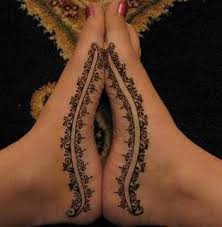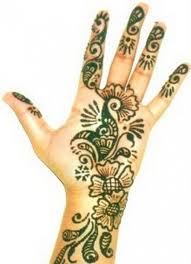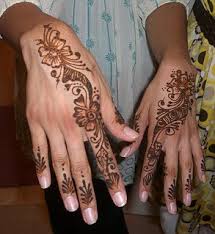Free Mehandi Design Biography
Mehndi is the application of henna as a temporary form of skin decoration in India, Pakistan and Bangladesh as well as by expatriate communities from those countries. The word mehndi is derived from the Sanskrit word mendhikā.[1] The use of mehndi and turmeric is described in the earliest Vedic ritual books. Haldi(Staining oneself with turmeric paste) as well as mehndi are Vedic customs, intended to be a symbolic representation of the outer and the inner sun. Vedic customs are centered around the idea of "awakening the inner light".
Traditional mehndi designs are of representations of the sun on the palm, which, in this context, is intended to represent the mind.
Mehndi decorations became fashionable in the West in the late 1990s, where they are sometimes called henna tattoos. Henna is typically applied during special occasions like weddings and Muslim Festivals such as Eid-ul-Fitr and Eid-ul-Azha . Similarly in Hindu festivals like Karva Chauth, Diwali, Bhaidooj and Teej. In some Hindu festivals, many women have Henna applied to their hands and feet. It is usually drawn on the palms and feet, where the design will be clearest because the skin on these surfaces naturally contains less of the pigment, melanin. Henna was originally used as a form of decoration mainly for brides.








Mehndi is the application of henna as a temporary form of skin decoration in India, Pakistan and Bangladesh as well as by expatriate communities from those countries. The word mehndi is derived from the Sanskrit word mendhikā.[1] The use of mehndi and turmeric is described in the earliest Vedic ritual books. Haldi(Staining oneself with turmeric paste) as well as mehndi are Vedic customs, intended to be a symbolic representation of the outer and the inner sun. Vedic customs are centered around the idea of "awakening the inner light".
Traditional mehndi designs are of representations of the sun on the palm, which, in this context, is intended to represent the mind.
Mehndi decorations became fashionable in the West in the late 1990s, where they are sometimes called henna tattoos. Henna is typically applied during special occasions like weddings and Muslim Festivals such as Eid-ul-Fitr and Eid-ul-Azha . Similarly in Hindu festivals like Karva Chauth, Diwali, Bhaidooj and Teej. In some Hindu festivals, many women have Henna applied to their hands and feet. It is usually drawn on the palms and feet, where the design will be clearest because the skin on these surfaces naturally contains less of the pigment, melanin. Henna was originally used as a form of decoration mainly for brides.
Free Mehandi Design
Free Mehandi Design
Free Mehandi Design
Free Mehandi Design
Free Mehandi Design
Free Mehandi Design
Free Mehandi Design
Free Mehandi Design
Free Mehandi Design
Happy Birthday! Free Hand Mehndi Design Contest #2
Arabic Hina, Free Mehndi Styles, Latest Mehndi Designs, Newest Mehndi From YsaPak.Com